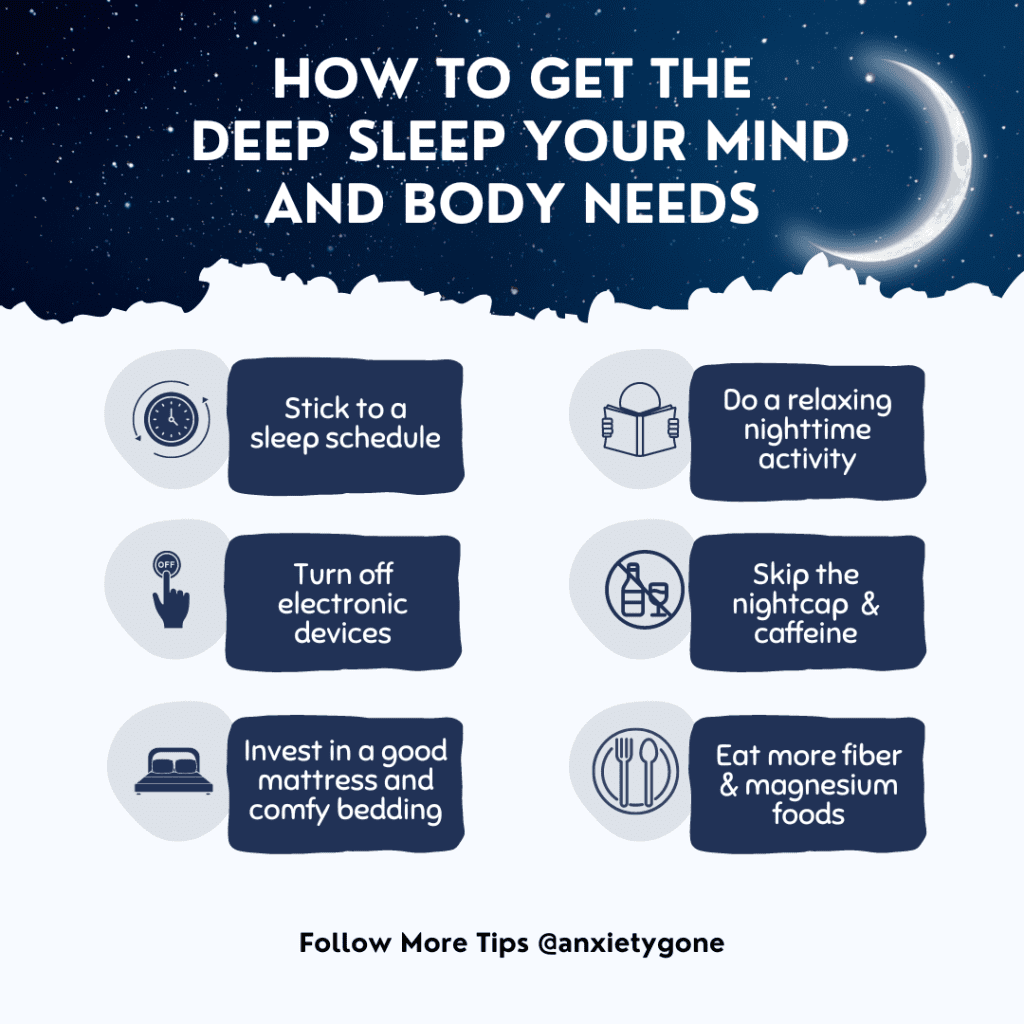Full Disclosure: Clicking on these links could mean a tiny commission for me, at no extra cost to you.
Deep sleep holds the key to waking up refreshed and ready to tackle the day? But deep sleep isn’t just about resting; it’s when your body repairs and regrows bone and muscle, and even strengthens your immune system. Most of this crucial deep sleep happens in the first half of the night, highlighting that quality is just as important as quantity when it comes to catching z’s. Unfortunately, skimping on sleep, intentional and not, can wreak havoc on your mental health, emotional stability, and overall well-being. So, it’s important to prioritize your sleep to get the deep rest you need to maintain a healthier, happier you. Curious to know how to improve deep sleep? Well, let’s find out.
- Best for Yoga → Yoga Download
- Best Blue Light Filter Glasses → Spektrum and Sleep On
- Best Sleep Tracking Device → Muse and Sleep On Health
- Best White Noise Machine → Amazon and Yoga Sleep
- Best Anti-Snoring Devices → Z Quiet
- Best for Sleep Meditations → Mindfulness App, and Headspace
- Best for Weighted Blankets → Nuzzie
- Best for Breathwork → Inward Breathwork
- Best for Mattresses → Puffy
- Best for Drinkable Supplement → Sleep Breakthrough
What is Deep Sleep?

Deep sleep, also known as slow-wave sleep (SWS), stage 3 NREM sleep or delta sleep, is one of the most vital stages of the sleep cycle. This stage is characterized by the brain producing slow delta waves, which are the slowest and highest amplitude brain waves. It’s crucial for physical restoration, mental clarity and overall health.
Let’s delve into what deep sleep is, why it’s important, and how it differs from other sleep stages.
Stages of Sleep:
The sleep cycle is composed of several stages, including both non-rapid eye movement (NREM) and rapid eye movement (REM) sleep. NREM sleep is further divided into three stages:
- Stage 1 (N1): This is the lightest stage of sleep, where you drift in and out of sleep. It’s a transitional phase between wakefulness and sleep.
- Stage 2 (N2): This stage accounts for about 50% of your total sleep time. It’s a light sleep stage where heart rate slows, and body temperature drops.
- Stage 3 (N3): This is deep sleep, the most restorative phase. It’s harder to wake someone from deep sleep, and it typically occurs in longer stretches during the first half of the night.
REM sleep, the final stage, is associated with vivid dreams and plays a key role in cognitive functions like memory and learning.
How Deep Sleep Differs from Other Sleep Stages:
Deep sleep is distinct from the other stages of sleep in several ways:
- Brain Activity: During deep sleep, the brain produces slow delta waves, while in REM sleep, brain activity is similar to that during wakefulness.
- Physiological Changes: Deep sleep is characterized by slowed heart rate, reduced blood pressure, and lower body temperature. In contrast, REM sleep involves rapid eye movements, increased brain activity, and temporary muscle paralysis.
- Restorative Functions: While REM sleep is crucial for cognitive functions and emotional regulation, deep sleep is more focused on physical restoration and detoxification.
Why is Deep Sleep so Important?
Deep sleep is often considered the most important stage of sleep because it plays a key role in several bodily functions and offers several benefits. Many of the restorative magic of sleep happens predominantly during this “deep sleep” phase. So, let’s break down all the ways deep sleep supports your body and mind.
1. Deep Sleep Helps Your Body Repair and Regenerate
Imagine your body’s maintenance crew clocking in for the night shift during deep sleep. Growth hormones that are essential for tissue repair and healing are released during this stage. Whether you’ve powered through an intense workout or tackled a physically demanding day, deep sleep ensures your body gets the recovery it needs.
2. Deep Sleep Helps You Process Memory and Learning
Ever wonder how your brain sorts through the avalanche of information you gather daily? Deep sleep is the hero here, handling memory consolidation and transforming the day’s raw data into long-term memory.
3. Deep Sleep May Contribute to Creativity
Problems that seem like brick walls during the day often look more like stepping stones after a good night’s sleep. During deep sleep, your brain reorganizes and restructures information, boosting creativity and enhancing problem-solving skills. It’s your brain’s way of hitting the refresh button and sparking new ideas.
4. Deep Sleep Is Associated with Emotion Regulation and Processing
Struggling to recognize important social cues or process emotional information accurately? Lack of deep sleep might be to blame. Research suggests that insufficient deep sleep can make everything feel a bit ‘off’ emotionally. Ensuring you get enough deep sleep helps keep your emotional radar finely tuned.
5. Deep Sleep Supports Your Metabolism and Glucose Control
Deep sleep is a critical player in managing your body’s glucose levels, ensuring your metabolism runs smoothly. Research indicates that a lack of deep sleep can reduce insulin sensitivity, potentially increasing the risk of developing type 2 diabetes. It’s like having a finely tuned engine that runs optimally with the right fuel.
6. Deep Sleep Boosts Your Immune System
During deep sleep, your immune system kicks into high gear, producing proteins called cytokines that help fight off infections, inflammation, and stress. Additionally, disease-fighting substances are released or created, arming your body against foreign invaders like bacteria and viruses. Deep sleep is your body’s best defense team.
Negative Effects of Not Getting Enough Deep Sleep
Lack of deep sleep can lead to several negative consequences, including:
- Weakened Immune System: Without adequate deep sleep, the immune system becomes less effective at fighting off infections and illnesses.
- Cognitive Impairment: Memory consolidation is impaired, leading to difficulties in learning and retaining new information.
- Mood Disorders: Chronic deep sleep deprivation can contribute to mood disorders like anxiety and depression.
- Physical Health Issues: Increased risk of chronic conditions such as diabetes, heart disease, and obesity.
But here’s the kicker: getting enough deep sleep can be a challenge. So, what’s stopping us from getting the deep sleep our bodies and brains desperately need? Let’s dive into the common factors affecting deep sleep and how to tackle them.
Factors Affecting Deep Sleep
Achieving deep sleep can be influenced by a variety of factors, including lifestyle choices, environmental conditions, and psychological states. Understanding these factors can help in making necessary adjustments to improve sleep quality and duration.
Here are some common factors affecting deep sleep:
- Lack of Physical Activity
- Poor Diet and Nutrition
- Late-Night Eating
- Alcohol and Substance Use
- Inconsistent Sleep Schedule
- Napping Habits
- Too High or Too Low Bedroom Temperature
- Exposure to Bright Light in the Evening
- Noise Levels
- Presence of Electronic Devices
- Uncomfortable Bedding, Mattress or Pillows
- Stress and Anxiety
- Mental Health Conditions like Depression and Anxiety
- Engaging in Stimulating Activities Before Bed
- Age
- Genetics
- Hormonal Fluctuations
- Medications, like Beta-Blockers, Anti-Anxiety Medications and Antidepressants
- Sleep Disorders like Sleep Apnea, Restless Leg Syndrome, and Insomnia
- Chronic Illnesses like Heart Disease, Diabetes, and Chronic Pain
7 Strategies on How to Improve Deep Sleep
Remember, achieving deep sleep doesn’t happen overnight. The key is to take small, consistent steps to improve your sleep hygiene. Start with one or two changes, and once they become second nature, gradually add more. Investing in a high-quality mattress and pillows is certainly an important step for increasing sleep, but there are also many budget-friendly tweaks you can make to “sleepify” your space. Here are 7 sleep strategies to help you increase your deep sleep one-night at-a-time.
1. Creating a Sleep-Friendly Sanctuary
Your bedroom should be your sleep sanctuary, a place where rest comes naturally. To enhance your sleep quality, keep your room cool, quiet, and dark. Simple additions like earplugs, an eye mask, or a white noise machine can make a big difference. The steady, consistent sound of white noise can block out other noises and help create a serene environment that’s perfect for sleep. But why stop at white noise? There’s also pink noise, brown noise, blue noise, and more! Find the perfect ‘noise’ to suit your sleep needs. Additionally, other soothing sounds like soft rain or forest birds can create a peaceful backdrop, gently nudging you toward a restful slumber.
2. Stick to a Sleep Routine
Consistency is crucial. Going to bed and waking up at the same time every day helps reinforce your body’s sleep-wake cycle, making it easier to fall asleep and stay asleep throughout the night. Incorporate calming activities like reading or sleep meditation into your nightly routine to signal to your body that it’s time to unwind and prepare for restful sleep.
3. Eat a Diet for Better Sleep
Certain foods can promote better sleep, such as those rich in fiber and magnesium.
Nutrient-packed foods like fruits, vegetables, and whole grains are rich in fiber, which help stabilize blood sugar levels and benefit your sleep quality. Studies suggest that high-fiber diets can lead to more time spent in the restorative stages of deep sleep too.
Magnesium is another crucial mineral for sleep, as it helps regulate neurotransmitters and hormones that promote relaxation and sleep. Foods such as leafy green vegetables, nuts, seeds, whole grains, and fish are excellent sources of magnesium. By including these foods in your daily meals, you can support your body’s ability to relax and fall into a deeper, more restorative sleep. Research indicates that magnesium helps maintain healthy levels of GABA, a neurotransmitter that encourages calm and peaceful sleep. So, adding a handful of almonds or a serving of spinach to your dinner could be a simple and delicious way to enhance your sleep.
On the other hand, you’ll want to make sure you’re avoiding stimulants, such as caffeine close to bedtime. Eating heavy meals later in the day can also disrupt your sleep. So, in addition to eating the right sleep-friendly foods, make sure you’re investing in sleepy eating habits too.
4. Get Your Body Moving Some More
Physical activity isn’t just beneficial for your heart; it can also help you achieve deeper sleep. Exercise regulates your internal body clock, making you feel naturally ready for rest as bedtime approaches. Both cardio and strength training are great, but be sure to switch to more gentle activities as bedtime nears. Not sure where to begin? Give Yoga Burn a try.
5. Manage Your Stress and Anxiety
Stress and anxiety can turn bedtime into a real struggle. Research shows that high stress levels not only make it harder to fall asleep, but also cut down on the deep sleep you get. Engaging in calming activities might be your ticket to deeper slumber.
Think of relaxation exercises, deep breathing, yoga, and meditation as your natural sleep aids, as they can help melt away anxiety and pave the way for better sleep. Taking a warm bath, diving into a good book, or listening to soothing music before bed can also help you unwind and drift off more easily.
Additionally, steer clear of stressful topics and heavy discussions before hitting the sack to keep your mind at ease.
If stress and anxiety continue to interfere with your sleep despite your best self-care efforts, it might be time to take things up a notch. Inward Breathwork offers online guided sessions that can slip you into a sleepy state and you can get your first month free.
6. Slip In Some Sleepy Supplements
Sleep supplements can be a helpful aid for those struggling to achieve restful sleep. Common supplements include melatonin, valerian root, magnesium, and chamomile, each offering unique benefits.
- Melatonin regulates sleep-wake cycles and manages insomnia.
- Valerian root promotes relaxation and improves sleep quality by increasing levels of a neurotransmitter called GABA.
- Magnesium supports muscle relaxation and reduces stress.
- Chamomile, often enjoyed as a tea, has mild sedative effects that can ease you into sleep.
- Lavender: reduces anxiety and improves sleep quality.
- L-Theanine: promotes relaxation and better sleep by enhancing calming brain chemicals.
- 5-HTP (5-hydroxytryptophan): enhances serotonin production.
- CBD Oil: helps reduce anxiety and improve sleep.
Try Sleep Breakthrough, a leading supplement for sleep problems. It’s a delicious drinkable mix that you take 1 hour before you plan on going to bed. Simply mix 2 scoops with a cup of water and enjoy. Within 30-45 minutes, you’re nervous system will calm down and before you know it, you’ll be in sleep mode.
7. Doze Off to Binaural Audio Tones
8. Sharpen Up on your Sleep Habits
Improving your nightly sleep habits can make a world of difference in your overall well-being. Start by establishing a consistent sleep schedule—going to bed and waking up at the same time every day helps regulate your body’s internal clock (or circadian rhythm).
Limit exposure to screens and bright lights an hour before bed, as the blue light can interfere with melatonin production.
You’ll also want to give yourself time to wind down and fall asleep. So dedicate an hour before bed to be tech-free and spend that time doing calming activities, like a sleep meditation.
Journal your thoughts or do what is called “a brain dump” to let all of those racing thoughts that keep you up at night out.
By making these small, consistent changes, you’ll set the stage for a more restful and rejuvenating night’s sleep.
9. Stay on Track by Monitoring Sleep Patterns
Using sleep tracking devices can provide insights into your sleep patterns. Keeping tabs on your sleep patterns is a powerful way to understand and improve your nightly rest. By monitoring your sleep, you can identify disruptions, track your sleep stages, and make informed adjustments to your routine. Here are some practical steps to help you stay on track:
Modern technology offers a variety of tools to monitor your sleep. Wearable devices like smartwatches and fitness trackers can measure your heart rate, movement, and even your breathing patterns to provide detailed insights into your sleep stages, including deep and REM sleep. Some devices also offer sleep scores and tips to improve your sleep habits.
Many smartphone apps are designed to help you track and analyze your sleep patterns. These apps often use your phone’s sensors or pair with wearable devices to monitor your sleep. They can provide data on how long you slept, how many times you woke up, and how much time you spent in each sleep stage. Some popular apps also include features like sleep sounds, bedtime reminders, and relaxation exercises.
Then, regularly review the data from your sleep tracking tools or diary. Look for trends and correlations, such as how your sleep quality changes with your diet, exercise, stress levels, or pre-sleep activities. Understanding these connections can help you make more informed decisions about your lifestyle and habits.
FAQs About Deep Sleep
- How much deep sleep do I need? Deep sleep needs vary, but typically, 1.5 to 2 hours per night is recommended for most adults.
- What are the signs of deep sleep deprivation? Symptoms include memory issues, decreased immunity, and increased stress levels.
- Can exercise improve deep sleep? Yes, regular physical activity can enhance deep sleep, but timing is important to avoid stimulating the body before bedtime.
- Are sleep aids safe to use regularly? Some sleep aids are safe for short-term use, but it’s essential to consult with a healthcare provider for long-term use.
- What foods promote deep sleep? Foods rich in magnesium, tryptophan, and melatonin, such as almonds, turkey, and cherries, can promote better sleep.
- How can I track my sleep patterns? Using wearable devices, sleep apps, and maintaining a sleep diary can help monitor and improve sleep patterns.
Conclusion
Cracking the code to deep sleep is a game-changer for your health and well-being. Deep sleep, or NREM Stage 3 sleep, is your body’s nightly repair session, clearing out brain waste and boosting your immune system. Missing out on this crucial phase can up your risk for issues like dementia and chronic diseases. By tuning into the factors that affect your sleep, crafting a cozy sleep haven, and embracing healthy sleep habits, you can unlock the magic of deep sleep and enjoy all its perks. Prioritize your shut-eye, and you’ll soon see big improvements in your mental and physical health, leading to a more vibrant and fulfilling life.
So, what’s stopping you from diving into deep sleep? It could be a weakened sleep drive, pesky sleep disorders, or certain medications and substances. But don’t worry—by tackling these hurdles and making thoughtful changes, you’ll be well on your way to achieving that restorative deep sleep your body craves. Sweet dreams and even sweeter mornings await!















